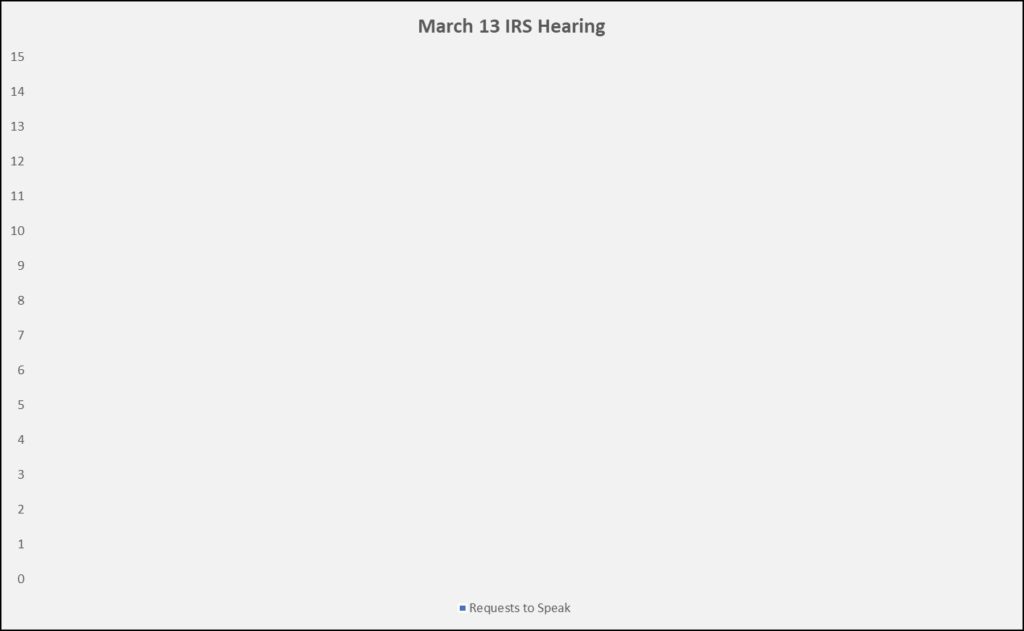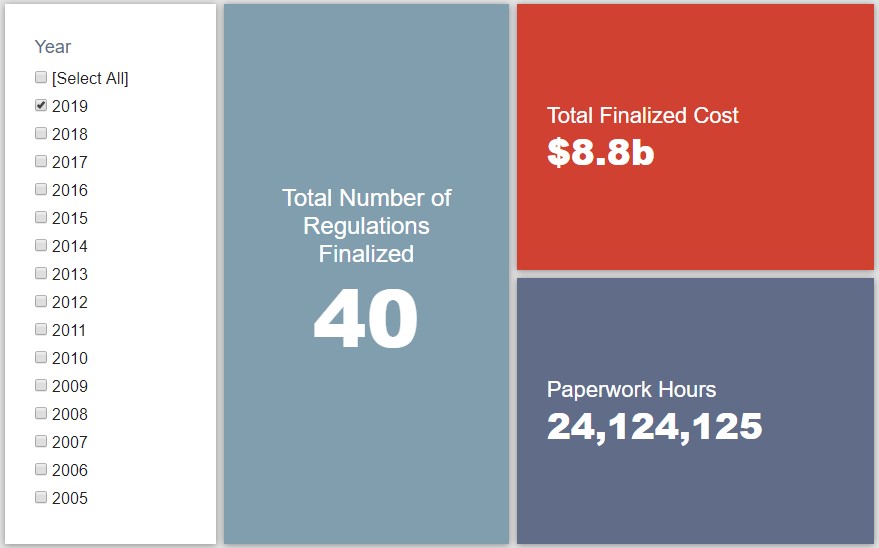Week in Regulation
March 11, 2019
A Costly Health Care Week
Rulemakings relating to various aspects of health care policy were the main highlights of last week. A pair of proposed rules provided the bulk of new costs. On the final rule side, however, there was a modest net reduction in regulatory burdens. Between both proposed and final rules last week, agencies published $4.1 billion in total net costs, as well as 3.5 million hours of new paperwork.
REGULATORY TOPLINES
- New Proposed Rules: 50
- New Final Rules: 68
- 2019 Total Pages: 8,564
- 2019 Final Rule Costs: $8.8 Billion
- 2019 Proposed Rule Costs: $7.7 Billion
TRACKING THE REGULATORY BUDGET
Two proposed rules out of the Department of Health and Human Services brought sizable cost figures. The most significant proposal seeks to implement various portions of the 21st Century Cures Act, and it brings $3.7 billion in total costs over 10 years. The second proposal also seeks to update interoperability issues under the Act, but it focuses primarily on their implications for Medicare and Medicaid. It brings $500 million in new paperwork compliance costs. Since these are both still proposed rules, these burdens do not yet count toward the fiscal year (FY) 2019 regulatory budget established under Executive Order (EO) 13,771.
The most notable rulemaking that did apply to the FY 2019’s regulatory budget was a deregulatory action out of the Department of Transportation (DOT). The rule revises certain requirements “to reduce the training time and costs incurred by Class B commercial driver’s license (CDL) holders upgrading to a Class A CDL.” DOT estimates that this could produce total savings of up to $278 million. The agency is now ahead of its FY 2019 regulatory savings goal by roughly $300 million.
So far in FY 2019 (which began on October 1, 2018), there have been 33 deregulatory actions (per the rubric created by EO 13,771 and the administration’s subsequent guidance document) against 14 rules that increase costs and fall under the EO’s reach. Combined, these actions yield quantified net costs of roughly $10.1 billion. This total, however, includes the caveat regarding the baseline in the Department of Agriculture’s “National Bioengineered Food Disclosure Standard.” If one considers that rule actually to be deregulatory, the administration-wide net total is approximately $3.4 billion in net costs. The administration’s cumulative savings goal for FY 2019 is approximately $18 billion.
THIS WEEK’S REGULATORY PICTURE
One can describe “regulatory policy” in many ways: mundane, opaque, monotonous, complex, legalistic. The list goes on. In order to help provide a clearer and more straight-forward view into this world, the American Action Forum will seek to provide a brief illustration of a notable regulatory trend we have identified in a given week. This week: that feeling when no one wants to speak at your regulatory comment hearing…

One of the hallmarks of the American rulemaking process is public participation. In addition to public comment periods offered by an agency when it proposes a rule, many times an agency will hold a public hearing to let anyone offer their input. Sometimes no one really cares about a proposed change enough to ask to speak, however, as the Internal Revenue Service (IRS) learned this week.
The chart above shows the number of requests submitted to the IRS to speak at a scheduled March 13 hearing on “Estate and Gift Taxes: Difference in the Basic Exclusion Amount,” a rule proposed in November. This week, the IRS cancelled the meeting because “no one has requested to speak.” The interest in the hearing seems reflective of the public’s interest in the proposal in general. According to Regulations.gov, the proposal received just 15 comments during the written period, which closed on February 21. IRS also published notices announcing three other hearings this past week; one wonders what level of interest they may draw.
TOTAL BURDENS
Since January 1, the federal government has published $16.5 billion in net costs (with $8.8 billion in finalized costs) and 22.8 million hours of net paperwork burden increases (including roughly 24.1 million hours from final rules). Click here for the latest Reg Rodeo findings.












